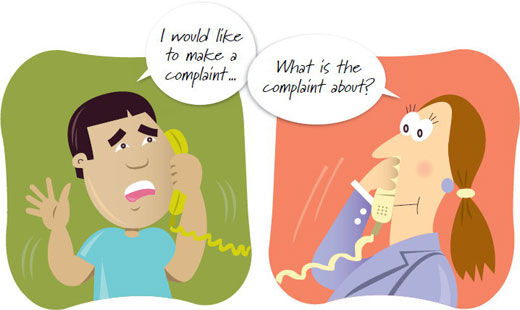There are two types of complaints or disputes that you may experience as an energy customer. If the matter is about the supply of energy it is considered an energy supply complaint. Otherwise, it is a general consumer complaint.
| Examples of energy supply complaints |
Examples of general consumer complaints |
- connections
- disconnections
- bills
- interruptions
- debt recovery
- meters
- energy marketing agents
- safety in the supply of energy
|
- hot water systems
- solar panels
- heaters
- air conditioners
- quality of work by tradespeople
- LPG gas bottles
- appliances
- safety of appliances
|
If you have a general consumer complaint, you should contact the business that you purchased the goods or services from in the first instance. If the dispute is not resolved, you can contact the Department of Commerce (Consumer Protection) Advice Line on 1300 304 054.
How you can resolve an energy supply complaint depends upon whether your supplier is licensed (e.g. Synergy, Horizon Power, Alinta Energy or Kleenheat Gas) or exempt (e.g. shopping centres and caravan parks).
Licensed retailers and distributors
If the complaint or dispute is about a licensed retailer or distributor, contact the organisation directly in the first instance.
Each licensed retailer or distributor must develop and use a standard complaints and dispute resolution procedure.
If the matter is not resolved with the licensed retailer or distributor, you can take the complaint to the Energy and Water Ombudsman.
If the licensed electricity retailer or electricity distributor does not acknowledge your complaint within 10 business days, you are entitled to a service standard payment. You will also be entitled to a service standard payment if they do not address the matters in the complaint within 20 business days.
It is always a good idea to keep records of your contacts with the retailer or distributor.
Exempt retailers and distributors
If the complaint or dispute is about an exempt retailer or distributor, you should first raise the issue directly with your exempt retailer or distributor. If the matter is not resolved after this stage, you may consider seeking legal advice.
Although Energy Policy WA has no formal role in mediating between exempt retailers or distributors and their customers, you may contact it to discuss your concerns. If Energy Policy WA receives complaints about an issue, it may take this into account in future policy development.
The Energy and Water Ombudsman
The Energy and Water Ombudsman provides free, independent complaint resolution services for small use customers of licensed energy retailers and distributors.
The Energy and Water Ombudsman only deals with energy supply complaints (such as billing, disconnection or debt recovery). The Energy and Water Ombudsman cannot investigate general consumer complaints, or complaints about the price of energy.
At the end of an investigation, you and your retailer or distributor may agree on a resolution. However, if you cannot agree, the Energy and Water Ombudsman has the authority to make a binding decision up to a value of $20,000, or up to $50,000 with the agreement of your retailer or distributor.
The Energy and Water Ombudsman cannot deal with complaints that are being, or should be, dealt with by a court or tribunal.
Always contact your retailer or distributor first. If you do not first raise your complaint with your retailer or distributor, the Energy and Water Ombudsman will refer the matter back to your retailer or distributor before investigating further.
Economic Regulation Authority
The ERA does not investigate individual complaints by customers.
However, it can investigate and deal with breaches by licensees (e.g.
retailers and distributors) of the conditions of their licence.
The Energy and Water Ombudsman reports licence breaches by retailers and distributors to the ERA.
-
I have an energy supply complaint
e.g. connections, disconnections, billing, interruptions, debt recovery.
-
My energy is supplied by a licensed supplier
e.g. Synergy, Horizon Power, Alinta Energy or Kleenheat Gas.
-
My energy is supplied by an exempt supplier
e.g. shopping centres, caravan parks.
-
Contact my energy supplier
e.g. management company, centre owner.
Electricity service standard payments
There are service standards that retailers and distributors must meet when supplying energy. In some cases, you will be entitled to a payment if a standard has not been met.
Electricity customers are entitled to a service standard payment if the following service standards are breached.
| Service standard |
What happened? |
Payment |
Application |
| Failure to reconnect within required timeframe |
Supply is not reconnected within the timeframes prescribed. |
$60 per day (up to $300) |
Apply to retailer within 3 months
|
| Wrongful disconnection |
Retailer or distributor fails to follow disconnection procedures. |
$100 for each day disconnected (no maximum applies) |
Payment made automatically – do not have to apply for a payment |
| Failure to acknowledge a query or complaint |
Retailer or distributor fails to acknowledge (10 business days) or respond (20 business days) to a query or complaint. |
One-off payment of $20 |
Apply to retailer or distributor within 3 months
|
| Failure to provide notice of planned interruption* |
Horizon Power or Western Power fails to provide at least 72 hours’ notice of a planned interruption. |
One-off payment of $20 |
Apply to distributor within 60 days |
| Interruptions exceeding 12 hours* |
Supply is interrupted for more than 12 hours. |
One-off payment of $120 |
Apply to distributor within 60 days |
* only applies to a person who consumes no more than 50MWh of electricity per year.

